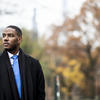Operating Room Artist
David Dugue, CST ’15, MED ’21, remembers the dedication his single mother, Margaret Cesarius, put into her job as a nurse taking care of surgery patients at Franklin Hospital on Long Island, New York.
“She’d work insane hours,” Dugue recalled, leaving his maternal aunt and grandmother with “pretty involved hands” in raising him and his sister.
The women in Dugue’s life exposed him to a little bit of everything in his adolescence: football and clarinet, basketball and piano, arts and crafts. During one stretch they imposed a requirement to read one book every week.
But tragedy struck when Dugue’s aunt, Marie Lourdes Cesarius, was diagnosed with multiple sclerosis. At first, helping to care for her during her illness helped foster a burgeoning interest in healthcare for Dugue, also inspired by his mother’s vocation. But his aunt’s passing in middle school shook his resolve in a way that resonated all the way to his pre-med undergraduate work at Temple.
“A lot of my desire to go into medicine was to help her,” Dugue says. “But, at the same time, my motivation also wavered when she passed away.”



